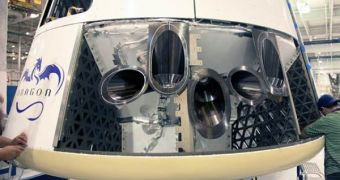SpaceX is one of the largest and most successful private space companies, having already performed a number of launches on vehicles designed by its own experts. The Space Exploration Technologies (SpaceX) Corporation is based in Hawthorne, California, and it plans to conduct the new test flight no later than the end of this year, officials from the company have announced. The Falcon 9 is the larger cousin of the Falcon 1 missile, which successfully flew to space this year. The Dragon spacecraft is designed to be a reusable capsule, for orbital missions, such as docking to the International Space Station (ISS), Space reports.
“The initial test flight will carry our Dragon spacecraft qualification unit (...) providing us with valuable aerodynamic and performance data for the Falcon 9 configuration that will fly on the following [Commercial Orbital Transportation Services] and [Commercial Resupply Services] missions for NASA,” the company announced in a media update recently. It has been developing the Dragon reusable capsule since 2006, under the American space agency's Commercial Orbital Transportation Services (COTS) program. SpaceX was also contracted by NASA to perform 12 flights to the ISS until the end of 2015, under a $1.6 billion agreement.
Back in 2005, the company announced that the first Falcon 9 launch had been sold to a government representative, and that its name was to remain classified. Because the US Air Force announces its launches even if the payloads themselves are classified, many experts believe that the customer is an American intelligence agency. The rocket's maiden flight was originally scheduled for 2007, but Falcon 1 and Falcon 9 took more time to develop and build than originally estimated. Under the COTS contract, SpaceX has to perform three demonstration flights until next year, but says that the launch to come is not one of those three, but still a test flight.
“The actual launch date will depend on a variety of factors, including weather and the overall launch schedule at the Cape, so that is a little harder to predict. Based on prior experience, launch could be anywhere from one to three months after Falcon 9 is integrated at the Cape in November,” the press release concludes. The Falcon 9 will be assembled on a launch pad at the Cape Canaveral Air Force Station, in Florida, no earlier than November, and a launch is expected about three months later.

 14 DAY TRIAL //
14 DAY TRIAL //